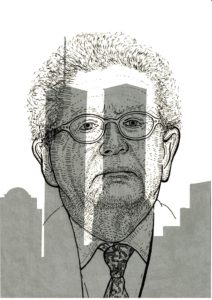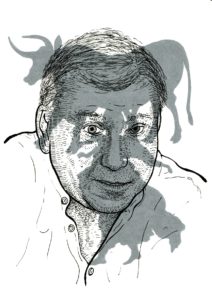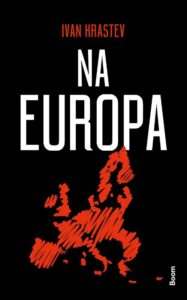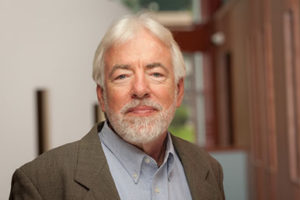
James K. Boyce – Photo by Matthew Cavanaugh
Is capitalism on the brink of joining the dustbin of history? And what would a post-capitalist society and a sustainable economy look like?
Since the onset of the Industrial Revolution, the world has experienced historically unprecedented levels of growth, with capitalism raising the standard of living of many nations. At the same time, capitalism has generated immense contradictions (exploitation of labor and nature, huge economic inequalities and gross social injustices), and these traditionally have been the main foci of radical political movements advancing the vision of a just socioeconomic order. But is the era of capitalist growth now coming to an end?
Renowned economist James Boyce, senior fellow at the Political Economy Research Institute at the University of Massachusetts, Amherst, offers critical insights on all of these questions, which should be food for thought for all progressives in the age of the revival of democratic socialism. Professor Boyce is the author of the forthcoming books Economics for People and the Planet: Inequality in the Era of Climate Change and The Case for Carbon Dividends.
C.J. Polychroniou: There are economists today who are arguing that the era of capitalist economic growth is over. Is capitalism, in your own view, on its deathbed, soon to join the dustbin of history like previous economic systems such as feudalism?
James Boyce: Your question really has two parts. One is about the future of capitalism, the other about the future of economic growth. The answers depend on what we mean by both of these terms, “capitalism” and “economic growth.”
Let me start with growth. Whenever we talk about this, we need to ask: Growth of what? Conventional economists use the term to mean growth of GDP, gross domestic product, the monetary value of all the goods and services produced in the economy that carry a price tag. Yet we know that GDP is a hodgepodge of things that are good, bad and useless. It not only includes good things, like food and housing and music, but also bad things, like the costs resulting from wars, prisons and environmental disasters. GDP also includes some useless things, like one-upmanship spending for what Thorstein Veblen called “conspicuous consumption,” the aim of which is merely to attain a higher position in the social pecking order, spending that does not add to a society’s well-being since one person’s gain is just another’s loss. The only thing that all the items counted in GDP have in common is that they carry a market price tag.
At the same time, GDP doesn’t count much that is very important to human well-being. It doesn’t count good things without a price tag, like the unpaid labor devoted to caring for children and the elderly, or ecosystem services, or any of the proverbial “best things in life that are free.” It doesn’t account for things that reduce our well-being like environmental degradation and violence. So, all in all, GDP is a deeply flawed measure of a society’s well-being. Preoccupation [with] how fast it grows is misplaced.
The same applies to “limits to growth,” a phrase popularized by some well-meaning environmentalists. Of course, there are limits to growth, if by this we mean the growth of bad things like pollution, natural resource depletion, imprisonment or violence. None of these can grow forever. The limits may be hard to identify with precision – what, for example, is the maximum percent of a nation’s population that can be put in jail? Three percent? Ten? Twenty-five? – but we know there is a limit.
But this does not mean there are limits to the growth of all the good things, too — things that improve human well-being rather than diminishing it. There are no natural limits to the growth of art or music or knowledge. There are limits on how much food and other necessities we require, but these are limits on demand, not necessarily on our ability to supply them.
This distinction between good things and bad things wouldn’t matter if they were locked together in some fixed and immutable ratio, making it impossible to have more of one without more of the other. But the good/bad ratio between them is a variable, not an unchanging parameter, and a fundamental aim of any economy that works for people and the planet is to move the balance in favor of the good.
The “limits to growth” slogan has obscured this, just as GDP has obscured our understanding of human well-being. It conveys the implication that we face an inexorable trade-off between protecting the environment and advancing economic well-being. Ironically, this is the very same message that is propagated by fossil fuel corporations and diehard opponents of environmental protection. In the end, it’s a message that limits the growth of environmentalism itself.
I’ve argued that we need a new banner: Grow the good and shrink the bad.
What about capitalism?
A bit like growth, “capitalism” is a word that can mean different things to different people. For some, it means the division of society into two opposing classes: the vast majority who work for a living, and the elite few who live off the proceeds of other people’s labor by virtue of ownership of capital. For others, it means just about anything involving markets, or wage labor or the profit motive. In talking about whether capitalism is on its “deathbed” – a better image might be in its death throes, since if it is dying, it’s not going gently – we need to unpack these different meanings.
To me, what is not sustainable is the concentration of wealth and power in the hands of a few. If this is what you mean by capitalism, I truly hope that its days are numbered. Oligarchy, which is the name for concentrated wealth and power, is bad for people not only because it condemns many to poverty and powerlessness, but also because it erodes the mutual trust and affection without which a society cannot function happily or well. And it’s bad for the planet because it allows those at the top of the pyramid to use and abuse the environment – both as a source of raw materials and as a sink for the disposal of waste – at the expense of everyone else.
Historically, the political left has seen oligarchy as an outcome of unfettered markets, while the political right has seen it as an outcome of an unfettered state. In truth, however, the defining feature of oligarchy is not the balance between the market and the state. Its defining feature is the highly unequal distribution of wealth and power. If purchasing power and political power are concentrated in the hands of a few, it doesn’t matter whether we have a “free-market” economy or a state-run economy: the result will be unhappy outcomes for most of the people and for the planet, too.
Capitalism cannot exist without markets. Can markets exist without capitalism?
Sure. Markets existed before capitalism, and markets will exist after capitalism, however you define it.
Here is a thought experiment: Imagine a society in which a substantial chunk of assets [is] owned in equal and common measure by all. These assets – call them universal property – would include gifts of nature, like the trees in the forest, the fish in the sea, and the minerals in the ground, and also would include some of the institutional infrastructure that society creates and maintains, like financial systems and patent systems. These assets generate income in the form of payments for the use of nature’s sources and sinks, taxes on financial transactions and a share in royalties on patented innovations. Imagine that income derived from these assets is paid in equal monthly or quarterly dividends to every person – call it universal income from universal property.
The result would be an equally substantial leveling of the economy’s playing field. There would still be markets, in the sense of payments for goods and services. There would still be wages, in the sense of people being paid for work they do. There would still be the profit motive, in the sense of people seeking favorable returns on their investments of time and capital. And there would still be other, nonuniversal assets owned privately by individuals and cooperatives and businesses, or publicly by governments. But whatever you call the result, it would not be capitalism as we know it today. Instead, universal property would inject a dose of equality into the distribution of wealth and power. It would act as a kind of democratic antibody, strengthening the immune system of our body politic against oligarchy.
You might call this vision a new kind of capitalism. Or you might call it libertarian socialism, an idea embraced by Noam Chomsky, among others. To me, the label is less important than the substance: a democratic distribution of wealth and power.
What forms of resistance could be useful in order to hasten the transition to an economy that works for people and the planet?
I’m glad you are asking about “forms” of resistance, not assuming there is only one right path. We need to forge a broad alliance of people who act at multiple levels – personal, local, regional, national and global.
At the personal level, we see people choosing to conduct their lives – to work, consume and engage in civic activity –in ways that reflect pro-people and pro-planet values, resisting the temptation to look the other way.
At the local level, we see people struggling for environmental justice, defending the fundamental human right to a clean and healthy environment. We see the growth of cooperative enterprises, new agriculture and community-based clean energy initiatives that, together, are sometimes described as a “solidarity economy” that is incubating alternatives to the status quo.
At the regional level, we see efforts to develop low-carbon and no-carbon transportation systems, to safeguard clean water and open lands, and to build alliances across diverse communities who share a commitment to building an economy that works for people and the planet.
At the national and global levels, we see efforts to mobilize the people to demand policies that guarantee access to health care and education for all, protect the environment, promote peace, and reverse the toxic concentration of wealth and power in the hands of the “1 percent.”
By all these paths, people are resisting the degradation of human well-being and the environment and seeking to establish a more level playing field, build a more resilient economy and create a more vibrant democracy.
Sometimes we see a temptation to dismiss the efforts and paths pursued by others as less important or less virtuous than our own, as “false solutions,” useless or even counterproductive. This kind of one-size-fits-all arrogance is born of egoism, insularity and lack of imagination. It is inimical to building the alliances we need. So, dogmatism is something we should resist, too.
Is there hope for the planet, given that humanity is on the edge of a precipice due to global climate change? Is there a way forward?
There is a vast intermediate terrain between the extreme positions of claiming that climate change is not a problem and claiming that it is the end of the world. Both are forms of denial. The first denies the reality of climate change itself; the second denies the reality that we can do something about it.
Let’s be serious. The planet will survive climate change. Life on Earth will survive climate change, though unless we act today, many species may not. Humans will survive it, too, though unless we act today, many people may not and many more will experience needless suffering.
But we face a continuum of possibilities. The more carbon we dump into the atmosphere, the worse things will be. In fact, exponentially worse: if average global temperatures rise by 3°C [3 degrees Celsius] above the preindustrial level instead of 1.5°C, the damages will not be merely twice as high, but many multiples greater. Where humankind and the planet end up will depend, above all, on how quickly we stop using fossil fuels and shift instead to clean energy. As climate scientist Kate Marvel has put it [quoting earth system scientist Benjamin Cook], “climate change isn’t pass/fail.”
The good news is that we can take actions now to limit the degrees of damage. The bad news is that we aren’t acting nearly fast enough. The binding constraints are political, not technical.
I believe that there are four main arenas where we need to act. The first is to minimize the extent of climate change, above all by reducing our use of fossil fuels. At the level of public policies, this will require a set of complementary measures: carbon pricing that is anchored to hard emissions targets; investments in clean energy and energy efficiency; and smart regulations designed to support an efficient and equitable clean energy transition.
The second arena is adaptation. It is too late to prevent climate change altogether. So, we will need to invest in adaptation as well as mitigation. Here a key question is how resources available for adaptation should be allocated across and within countries. Conventional economics would assign priority to protecting the most “valuable” lives and property – in other words, protecting the people with the most wealth and power and their assets. In the face of rising sea levels and storm surge risks, for example, we could see the construction of sea walls that protect pricey real estate by diverting floodwaters into poor communities. A rights-based approach would start from a radically different premise: the principle that the right to a safe environment is held equally by all. It is neither a commodity that should be allocated on the basis of purchasing power, nor a privilege that should be allocated on the basis of political power. In this view, adaptation investments should be guided by human needs, prioritizing the communities that need them most.
The third arena for action is to build on the ways that reduced use of fossil fuels can bring about immediate and tangible improvements in public health by improving air quality. The burning of fossil fuels releases not only carbon dioxide, the main culprit in climate change, but also many other dirty pollutants that harm human health. While the damages from climate change are long-term and spread across the globe, the damages from air pollution are near-term and more localized, enhancing their political relevance. It makes good sense to cut emissions where the air quality benefits – known as “co-benefits” in climate policy – are greatest. We know that air pollution disproportionately afflicts people of color and low-income communities, so this is a matter not only of efficiency but also of environmental justice.
The fourth arena is carbon dividends. These recycle the extra money that consumers pay for fossil fuels as a result of carbon pricing as equal dividends to every person in the country or state implementing the policy. The government of Canada recently announced that it will introduce carbon dividends in provinces, including Ontario, that do not already have a carbon price. Carbon dividends are an example of universal income from universal property – the concept I mentioned earlier – the property in this case being the limited capacity of the biosphere to absorb carbon emissions. People pay based on their use of the scarce resource – the rich, who typically have the biggest carbon footprints because they consume more, pay more than others – and everyone receives an equal dividend based on common ownership. With a carbon price-and-dividend policy, the majority of people, including low-income households and the middle class, would come out ahead monetarily, without even counting the benefits of curbing climate change. Their dividends would more than offset what they pay in higher fossil fuel prices, helping to ensure durable public support for the policy.
The insufficiency of inequitable climate policies was demonstrated recently in France by the “Yellow Vest” revolt against President Macron’s government that broke out after his government imposed new taxes on gasoline and diesel in the name of fighting climate change. Across the country, hard-pressed working people took to the streets in protest. Macron, they contended, “talks about the end of the world while we are talking about the end of the month.” Polls showed that a large majority of the French people agreed. The new tax was rather modest – it would have added about 35 US cents to the price of a gallon of diesel and 12 cents to a gallon gasoline – but it was enough to provoke such a violent reaction that the government decided to suspend the policy.
The lesson is clear: to be politically sustainable, climate policies must be seen to be economically equitable.
—
C.J. Polychroniou is a political economist/political scientist who has taught and worked in universities and research centers in Europe and the United States. His main research interests are in European economic integration, globalization, the political economy of the United States and the deconstruction of neoliberalism’s politico-economic project. He is a regular contributor to Truthout as well as a member of Truthout’s Public Intellectual Project. He has published several books and his articles have appeared in a variety of journals, magazines, newspapers and popular news websites. Many of his publications have been translated into several foreign languages, including Croatian, French, Greek, Italian, Portuguese, Spanish and Turkish. He is the author of Optimism Over Despair: Noam Chomsky On Capitalism, Empire, and Social Change, an anthology of interviews with Chomsky originally published at Truthout and collected by Haymarket Books.
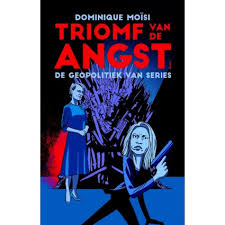 Series kleuren niet alleen de werkelijkheid, maar creëren ze tenslotte ook zelf, aldus Moïsi. Realiteit en fictie gaan door elkaar lopen. De hele wereld kijkt geboeid naar de series waarin Amerika zichzelf kastijdt en ze hebben dan ook wereldwijd invloed, terwijl Rusland en Poetin eigen series gebruiken als propaganda.
Series kleuren niet alleen de werkelijkheid, maar creëren ze tenslotte ook zelf, aldus Moïsi. Realiteit en fictie gaan door elkaar lopen. De hele wereld kijkt geboeid naar de series waarin Amerika zichzelf kastijdt en ze hebben dan ook wereldwijd invloed, terwijl Rusland en Poetin eigen series gebruiken als propaganda.